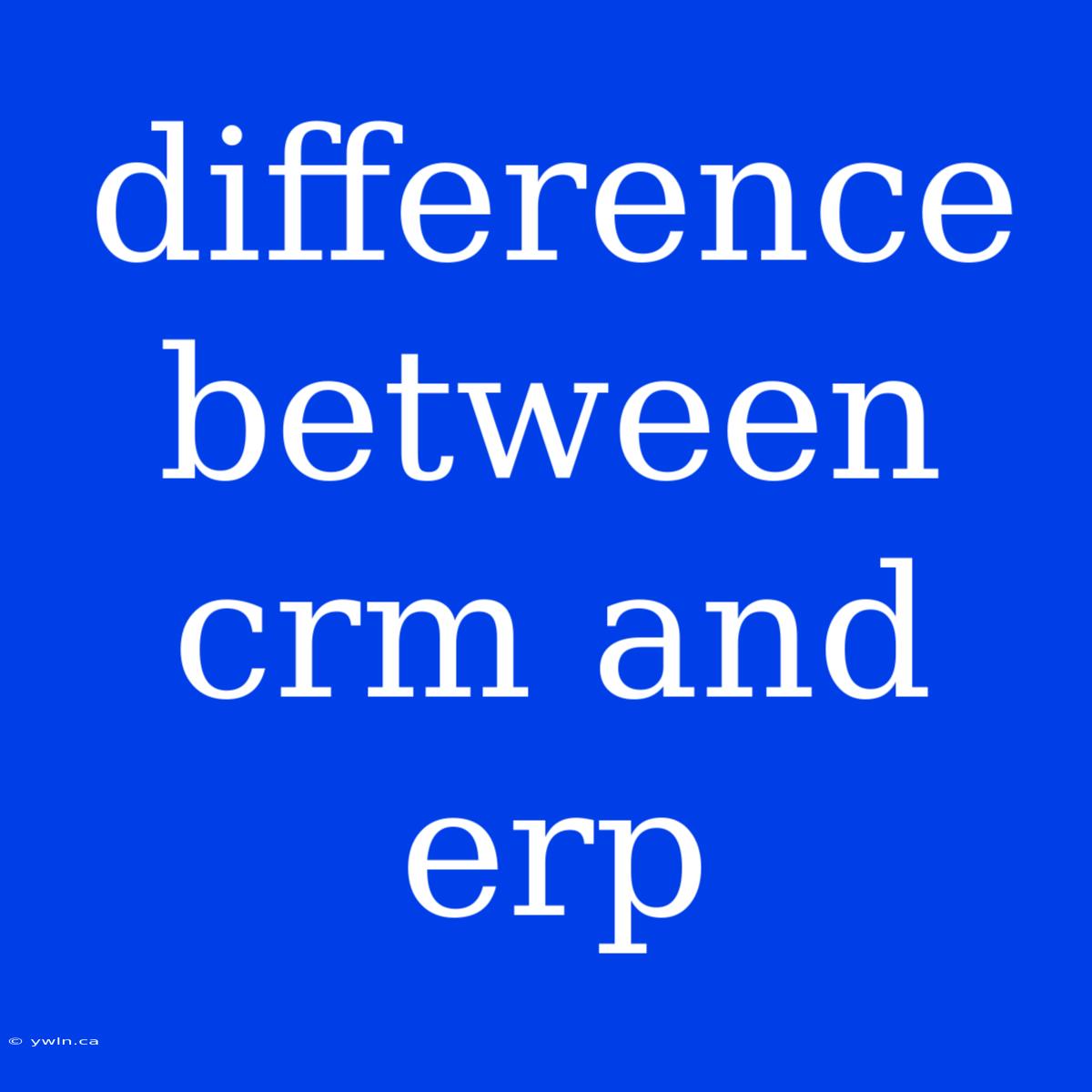Unveiling the Differences: CRM vs. ERP for Business Success
Is your business struggling to manage customer relationships while ensuring seamless operational efficiency? The answer might lie in understanding the difference between CRM (Customer Relationship Management) and ERP (Enterprise Resource Planning). These two systems are often confused, yet they play distinct roles in driving your business growth.
**Editor Note: ** CRM vs. ERP is a critical discussion for any business seeking to optimize its operations and customer interactions. Knowing how they differ and how they can work together is crucial for long-term success.
Analysis:
This guide delves into the nuances of CRM and ERP, providing a comprehensive breakdown of their functionalities, benefits, and how they complement each other.
Key Takeaways
| Feature | CRM | ERP |
|---|---|---|
| Focus | Customer Management | Business Process Management |
| Scope | Sales, Marketing, Customer Service | Finance, Operations, Human Resources, Supply Chain |
| Data | Customer Data | Financial, Operational, and Inventory Data |
| Implementation | Department-Specific | Enterprise-wide |
| Benefits | Improved Customer Satisfaction, Increased Revenue | Streamlined Operations, Reduced Costs, Better Forecasting |
CRM
CRM focuses on managing customer interactions and data to improve relationships, drive sales, and boost customer satisfaction.
Key Aspects
- Customer Data: CRM systems centralize customer information, including demographics, purchase history, preferences, and interactions.
- Sales Automation: CRM tools streamline sales processes, automating tasks like lead generation, lead nurturing, and opportunity management.
- Marketing Automation: CRM platforms enable targeted marketing campaigns, segmenting customers and tailoring messages for better engagement.
- Customer Service Management: CRM helps businesses track customer inquiries, resolve issues efficiently, and improve service quality.
Discussion
By providing a unified view of customer interactions, CRM empowers businesses to personalize communications, optimize marketing campaigns, and deliver exceptional customer service. This leads to higher customer retention, increased sales, and improved brand loyalty.
ERP
ERP focuses on managing and integrating business processes across different departments to optimize operations and improve efficiency.
Key Aspects
- Financial Management: ERP systems handle core financial functions, including accounting, budgeting, financial reporting, and forecasting.
- Inventory Management: ERP helps businesses track inventory levels, manage supply chains, and optimize stock ordering to minimize waste and delays.
- Human Resources Management: ERP systems manage employee records, payroll, benefits, and talent acquisition processes.
- Production Management: ERP tools help businesses plan and manage production schedules, track materials, and monitor production efficiency.
Discussion
ERP systems automate repetitive tasks, provide real-time data insights, and improve communication across departments. This leads to streamlined processes, reduced costs, better resource allocation, and improved operational efficiency.
CRM & ERP: A Powerful Synergy
While CRM and ERP serve different purposes, they can work together to create a seamless, data-driven business ecosystem.
Key Aspects
- Shared Data: Integrating CRM and ERP allows businesses to share customer data across departments, providing a holistic view of customer interactions and behavior.
- Improved Decision-Making: Combined data from CRM and ERP enables better insights for strategic decision-making, from product development to marketing campaigns.
- Streamlined Operations: Integrated systems automate workflows, reduce manual processes, and eliminate data silos for greater efficiency.
Discussion
By combining CRM's customer-centric approach with ERP's operational focus, businesses can achieve a competitive edge, improve profitability, and deliver exceptional customer experiences.
FAQs
Q: What are the main differences between CRM and ERP?
A: CRM focuses on customer management, while ERP manages business processes. CRM prioritizes customer interactions and data, while ERP deals with financial, operational, and inventory data.
Q: Can CRM and ERP work together?
A: Yes, integrating CRM and ERP can enhance business efficiency and customer experience. Sharing data allows for better insights and streamlined operations.
Q: What are the benefits of implementing CRM and ERP?
A: CRM benefits include improved customer satisfaction, increased revenue, and better customer retention. ERP benefits include streamlined operations, reduced costs, better forecasting, and improved efficiency.
Q: Which system should I implement first, CRM or ERP?
A: The answer depends on your business needs. If customer relationship management is a priority, implement a CRM first. If operational efficiency and process automation are crucial, prioritize ERP implementation.
Tips for Choosing the Right System
- Define Your Needs: Clearly identify your business goals and challenges to determine which system aligns best with your objectives.
- Consider Your Budget: CRM and ERP systems have varying costs, so determine your budget and explore options that fit your financial capacity.
- Evaluate Features: Analyze the features offered by different CRM and ERP solutions to ensure they meet your specific requirements.
- Seek Expert Advice: Consult with technology consultants or industry specialists to gain insights and recommendations on system selection.
Summary
Understanding the differences between CRM and ERP is crucial for any business seeking to optimize operations, improve customer relationships, and drive growth. By implementing the right systems and integrating them effectively, businesses can unlock a wealth of opportunities and achieve their strategic objectives.
Closing Message:
The choice between CRM and ERP is not a mutually exclusive one. Instead, consider them as complementary tools that can work in tandem to create a powerful business solution. By leveraging both systems effectively, businesses can build a strong foundation for sustainable growth and success.

